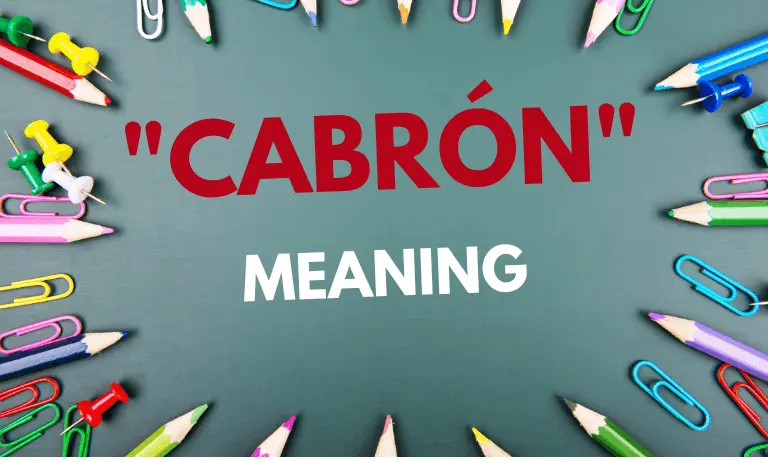Cabrón Word Meaning | What is term of Cabrón

Cabrón Word Meaning, Use and Example Sentence
The specific word Cabrón is a Spanish slang word that is arduous to understand and can be somewhat confusing in English, because there really is no direct translation for it. In this article we’ll discover what “Cabrón” means, how to break down its meaning, how it is employed and when it is suitable to refer to it.
What Does “Cabrón” Mean?
“Cabrón” is a Spanish slang term that literally means “male goat”, and can have different meanings depending on the context and region. In most cases, people consider it as a rude word and have an ability to humiliate somebody by calling him/her an idiot or a pest or a cheat. Nevertheless, it’s a positive tone and can be used in some specific context or region between friends as a joke. However, it’s important to be cautious with its usage as it can carry strong negative connotations in many situations.
Who Uses “Cabrón”?
“Cabrón” is so popular in Spanish and mostly used in South and Central Americas and most of Spain. However, some of the things you should know include that it is a slang and should not be used in formal events as well as around unfamiliar individuals. It’s, however, more frequently utilized with friends and in a jocular and informal setting.
Where Does “Cabrón” Come From?
The slang term “Cabrón,” generally Mexican and used as a blunt term for a jerk or bastard, which comes from the Latin word for goat, and since goats are especially aggressive when they’re males and the term was used specifically for males, that is where the dislike came from. So ‘cabrón’ in a vulgar tone but the same word can be used jokingly by friends which make them understand that the word isn’t restricted by its meaning but rather the situation of its usage.
The Suitable Way to Use
As “Cabrón” is derived from Spanish, this word can be said in different kinds of situations in all Spanish regions. It’s also likely that the usage of them depends on the culture, social part of the conversation, or even the manner in which it’s said. Under normal circumstances, and most circumstances, the word isn’t regarded as obscene; the term can then be used to mean that someone is sharp or intelligent or just a casual colloquial way of referring to a friend as “Dude”.
However, it can also be used to mean something that is in one way or the other connected to cheating, betraying or being an “ass”. Thus, similar to the first case, the term “Cabrón” depends on the type of relation that is being assumed or the type of relation between the person uttering and hearing the term. The problem is that this term is rather sensitive and has to be used more carefully because of this reason, because at the moment it’s too vague a definition.
Common Phrases with Cabrón
Positive
“¡Eres un Cabrón inteligente! Siempre encuentras una solución creativa.” (You’re a clever bastard! You always find a creative solution.)
Meaning: You’re a clever bastard! You always find a creative solution.
Negative
“No puedo creer lo Cabrón que fue Juan al engañar a su amigo.” (I can’t believe how deceitful Juan was in deceiving his friend.)
Meaning: I can’t believe how deceitful Juan was in deceiving his friend.
Friendly
“¡Oye, cabrón! ¿Cómo estás? ¡Hace tanto tiempo que no te veo!” (Hey, buddy! How are you? Long time no see!)
Meaning: Hey, buddy! How are you? Long time no see!
More Cabrón Terms
There’re many other terms of Cabrón that are used. Let’s take a look at a few!
| SPANISH | LITERAL TRANSLATION |
|---|---|
| Cabrón de mierda | Shitty bastard |
| Capullo | Jerk/Dumbass |
| Malparido | Bastard (literally: “poorly born”) |
| Pendejo | Idiot/Asshole |
| Mamón | Sucker/Idiot |
| Culero | Asshole (literally: “ass person”) |
Conclusion
“Cabrón” isn’t just a word; it is a linguistic enigma, which is overburdened with cultural and psychological meanings. The fact that it transitioned from a mild term, referring to a male goat, and a multifaceted phrase that encompasses a wide range of emotions from admiration to disdain is a testament to the web of human communication.
Like a chameleon of language, “Cabrón” adapts to its context, transforming based on where it’s said and what it points to about the speaker’s orientation toward authority, manliness, and compliance. Its unique ability to simultaneously offend and endear makes it a linguistic enigma worth exploring, reminding us of the rich diversity and fluidity of language. Also, it’s similar to words like “bastard,” “badass,” or “dude” in English but can be used both positively and negatively. Also, thanks a lot for reading this article.






